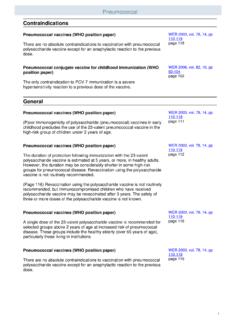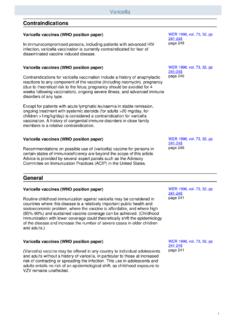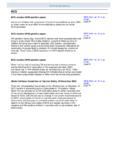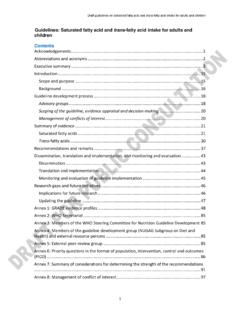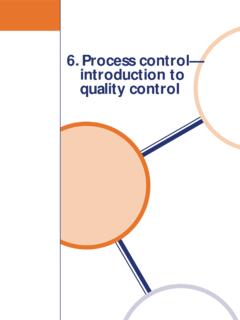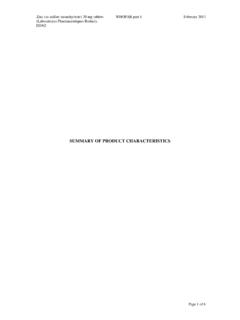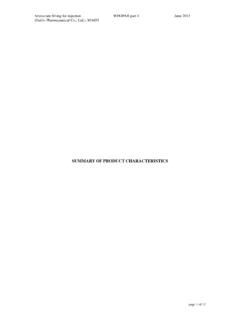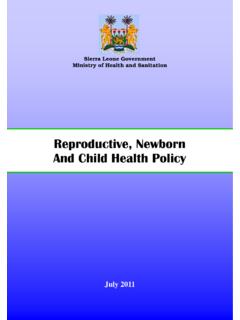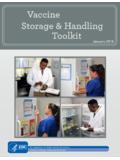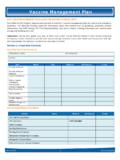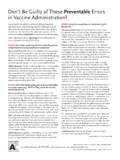Transcription of Vaccine Handling BCG - World Health Organization
1 BCG Proper Handling and reconstitution of vaccines avoids programme errors Reconstituted BCG, measles and yellow fever vaccines must be kept cooled and must be discarded after 6 hours after update 34 page 1 Proper Handling and reconstitution of vaccines avoids programme errors It is no longer necessary to ship and store freeze-dried vaccines (measles, yellow fever and BCG) at 20C. Instead, they may be refrigerated at +2 to + update 34 page 1 Proper Handling and reconstitution of vaccines avoids programme errors WHO no longer recommends that freeze-dried vaccines (measles, yellow fever, Hib and BCG) be shipped and stored at 20C.
2 Storing them at 20C is not harmful but is unnecessary and uses up valuable storage space in the deep-freeze. Instead, they should be kept in refrigeration and transported at +2 to + update 34 page 2 Thermostability of vaccines Reconstituted vaccines against measles, yellow fever and tuberculosis (BCG) are unstable vaccines; they should be used as soon as possible after reconstitution, be kept in a ice bath during the immunization session and should be discarded at the end of the page 48 Thermostability of vaccines Freeze-dried BCG vaccines, regardless of their substrain, are sensitive to ultraviolet and fluorescent light.
3 They should be packed in ampoules made from a substance of low light transmittance, such as amber glass, and should be protected from light when page 34 Thermostability of vaccines Reconstituted BCG Vaccine is very unstable and should be used during one working session of five to six hours. Residual Vaccine should be discarded at the end of the page 34 WHO-UNICEF effective Vaccine store management initiative: Modules 1 - 4 WHO recommended Vaccine storage conditions (Appendix 17_3).WHO/ page 1 1 Vaccine HandlingWHO-UNICEF effective Vaccine store management initiative: Modules 1 - 4 WHO no longer recommends that freezedried vaccines (measles, yellow fever, Hib and BCG) be shipped and stored at -20C.
4 Storing them at -20C is not harmful but is unnecessary. Instead, these vaccines should be stored and transported at +2C to + page 1 Temperature sensitivity of vaccines The recommended conditions for storing vaccines used in immunization programmes are shown in Appendix 81_1. This diagram also indicates the maximum times and temperatures in each case. At the higher levels of the cold chain, , at national (primary), and regional or province level, OPV must be kept frozen between -15oC and -25oC. Freeze-dried vaccines ( , BCG, measles, MMR and yellow fever) may also be kept frozen at -15oC to -25oC if cold chain space permits, but this is neither essential nor recommended.
5 At other levels of the cold chain (intermediate Vaccine stores and Health facilities), these vaccines should be stored between +2oC and +8oC. All other vaccines should be stored at between +2oC and +8oC at all levels of the cold chain. Liquid formulations of vaccines containing diphtheria, pertussis, tetanus, hepatitis B, Haemophilus influenzae type b, IPV and their combinations should not be page 2 Temperature sensitivity of vaccines Reconstituted BCG Vaccine is very unstable, must be kept cold, and must be discarded within six hours of reconstitution.
6 The reasons for these precautions are as follows: 1. There is a risk of contamination because BCG Vaccine , like other lyophilized live vaccines, does not contain any bacteriostatic agent. For this reason, WHO recommends that reconstituted lyophilized Vaccine should be kept cold and discarded at the end of six hours. 2. There is a loss of potency. Once reconstituted, all BCG vaccines should be kept cold and discarded within six hours, regardless of how many doses remain in the vial or page 25 Temperature sensitivity of vaccines Freeze-dried BCG vaccines, regardless of their substrain, are sensitive to ultraviolet and fluorescent light.
7 They should be protected from light when usedWHO/ page 25 2 Vaccine HandlingEnsuring the quality of vaccines at country level: guidelines for Health staff At the higher levels of the cold chain, at the national (central) and regional or provincial levels, OPV must be kept frozen between -15C and -25C. Freeze-dried vaccines, BCG, measles, MMR and yellow fever vaccines, may also be kept in this temperature range (-15C and -25C) if there is sufficient space in the cold chain, but this is neither essential nor recommended.
8 At other levels of the cold chain these vaccines should be stored between +2C and +8C. All other national immunization service vaccines should be stored between +2C and +8C at all levels of the cold page 13 Temperature sensitivity of vaccines Freeze-dried BCG vaccines, regardless of their substrain, are sensitive to ultraviolet and fluorescent light. They should be protected from light when usedWHO/ page 25 Cold Chain Equipment WHO-UNICEF effective Vaccine store management initiative: Modules 1 - 4 Ten key criteria for effective Vaccine store management were agreed at a meeting of experts, which took place at WHO Geneva in December 2001.
9 These criteria form the policy foundation for the effective Vaccine store management initiative and are listed below. Satisfactory performance is set as the Vaccine store meeting at least 80% of each criterion. Over a period of twelve months: 1. Pre-shipment and arrival procedures have ensured that all shipments were in satisfactory condition when received in the primary stores. 2. All vaccines have been stored within WHO recommended temperature ranges. 3. The capacity of cold storage has been sufficient to meet the demand.
10 4. The buildings, equipment and transport available to the programme have enabled the cold store to function effectively. 5. All buildings, equipment and transport have been correctly maintained. 6. Stock management has been effective. 7. Deliveries of Vaccine to the next level have been timely, sufficient and correct. 8. Minimal damage has occurred to the Vaccine during distribution. 9. The facility has followed standard operating procedures. 10. Human and financial resources have been page 2 WHO-UNICEF effective Vaccine store management initiative.
